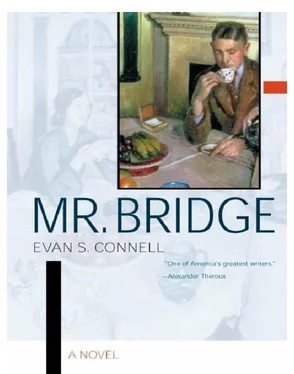He attended church on these occasions partly because he had no wish to attract attention by abstaining completely, but principally because she wanted him to. She needed him there not merely to demonstrate for the benefit of the neighborhood that her husband was not atheistic, but as actual bodily insurance against possible recrimination by God for such sins as he may have committed. In her heart she did believe God existed — He was a bit larger than a normal man, perhaps seven feet tall with a shaggy white beard untainted by cigar smoke, who dressed in a sort of white nightgown similar to the one He wore on the ceiling of the Sistine Chapel.
So it was that on a crisp, snowy, Sunday morning just before Christmas they were lodged in the first row of the balcony of the tidy little Congregational Church. Dr. Foster was hard at work and Mrs. Bridge listened attentively. Mr. Bridge was thinking about other things while he waited for the end of the service. The air in the balcony was stale and his head felt congested, but he did not like to sit on the main floor where he was obliged to look up at the minister. He scratched his ankle and thought of how much he would rather be at home in front of the fireplace with the Sunday paper.
He sighed, louder than he had intended. He blinked, yawned, and looked around. There was not much to look at. Everything about the church was passionless. He remembered Chartres — the chill, somberly echoing nave, the stone effigies, the ominous shadows and crude colored-glass windows. The Congregational Church was bland, as innocuous as the man in the pulpit. This was a different kind of religion. It was more comfortable, and the minister’s sermon was no doubt more comforting than the stark admonition of the Middle Ages. Here one never heard a warning from the man in the black robe. Here was no funereal sculpture in the niches, no blood-red windows. It was all quite pleasant.
He considered Dr. Foster discoursing on biblical events and wondered how a man could retain such innocence through the vicissitudes of life. It was as though the minister never worried or doubted. He resembled a stout, pompous little druggist, the sixty-year-old face as vacant as a melon — a trifle sleek and epicene, almost shiny. Time was not darkening or blemishing the surface of the man, nor had years disturbed the liquid flow of his faith. Imperturbably he stood in his pulpit and perpetuated a vision suitable for children. He stood so securely and lectured with such powerless conviction because he knew nothing else. He was a truly virtuous man, if not truly good.
It was time once again to sing.
Mr. Bridge got to his feet reluctantly. He opened the book and held it for his wife, who sang in a pure, slender tone. The congregation sang “Joy to the World,” and he sang a few phrases because he enjoyed the Christmas carols.
Yet while he was singing he reflected on the word “joy”—the archaic sound of this odd word, and its meaning. He reflected that he had occasionally heard people use this word. Evidently they had experienced joy, or believed they had experienced it. He asked himself if he ever had known it. If so, he could not remember. But he thought he must have known it because he understood the connotation, which would be impossible without having experienced it. However, if he had once known joy it must have been a long time ago. Satisfaction, yes, and pleasure of several sorts, and pride, and possibly a feeling which might be called “rejoicing” after some serious worry or problem had been resolved. There were many such feelings, but none of them should be called “joy.” He remembered enthusiasm, hope, and a kind of jubilation or exultation. Cheerfulness, yes, and joviality, and the brief gratification of sex. Gladness, too, fullness of heart, appreciation, and many other emotions. But not joy. No, that belonged to simpler minds.












